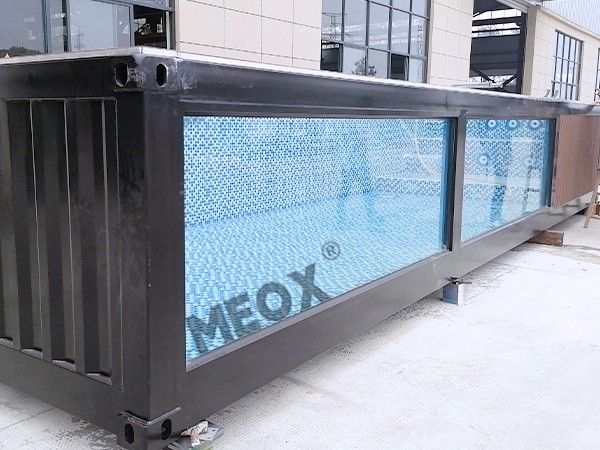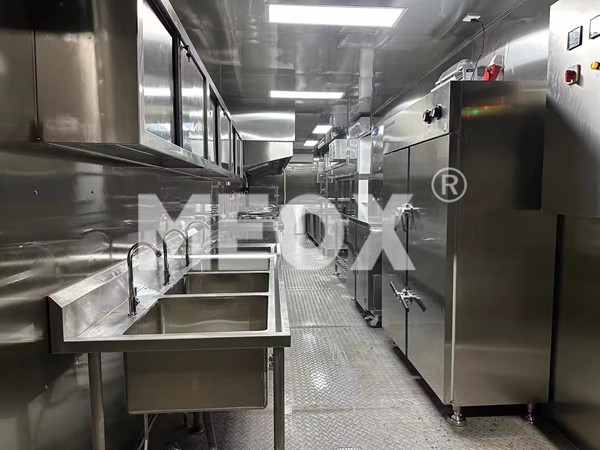As the world continues to face challenges such as limited arable land, climate change, and food security, innovative solutions like shipping container farms are gaining popularity. These farms use repurposed shipping containers to create self-contained, sustainable agricultural systems that can be used to grow a variety of crops in any environment. Whether you’re interested in a shipping container farm for sale, curious about the shipping container farm cost, or exploring the benefits of this technology, this guide will provide you with all the essential information.

What is a Shipping Container Farm?
A shipping container farm is a compact, modular farming solution that repurposes shipping containers for agricultural use. These containers are converted into controlled environments that support the growth of crops using hydroponics, aeroponics, or vertical farming systems. The concept behind shipping container farms is to maximize space while minimizing resource usage, making them ideal for urban areas or locations with limited land.
Shipping container farms can be equipped with all the necessary components for farming, such as lighting systems, water circulation, temperature control, and nutrient delivery. These farms can be fully operational indoors, allowing farmers to grow crops year-round, regardless of external weather conditions.
Features of Shipping Container Farms
Space Efficiency: One of the most significant benefits of shipping container farms is their ability to grow a large amount of food in a small space. Standard shipping containers are typically 20 or 40 feet long, but they can be modified to accommodate multiple layers of crops through vertical farming systems. This efficient use of space allows growers to cultivate more crops in urban areas or places where land is limited or expensive.
Climate Control: Shipping container farms offer full control over environmental factors, such as temperature, humidity, and light. This means crops can be grown in a wide range of climates, from hot and arid environments to cold and harsh conditions. The ability to control these variables helps ensure that plants receive the optimal growing conditions, leading to healthier crops and higher yields.
Water Efficiency: These farms use water-efficient farming techniques, such as hydroponics and aeroponics, where water is circulated in a closed system and reused. This reduces water consumption by up to 90% compared to traditional farming methods. Additionally, since shipping container farms are often located in urban areas, they help reduce the transportation costs and environmental impact associated with delivering food from rural farms.
Sustainability: Shipping container farms are a sustainable solution to modern agriculture. They allow for year-round farming in controlled environments, reducing the need for pesticides and herbicides. They also utilize energy-efficient LED lighting systems and renewable energy sources like solar panels, making them a more eco-friendly alternative to conventional farming.
Modularity: A key feature of shipping container farms is their modular design. Since they are based on shipping containers, they can be stacked or arranged in various configurations to create scalable farming solutions. Whether you need a small farm for personal use or a larger commercial operation, you can scale the farm by adding more containers.
Types of Shipping Container Farms
Small-Scale Shipping Container Farms: Ideal for personal or local use, small-scale shipping container farms can fit into residential backyards, rooftops, or urban lots. These farms are typically used for growing leafy greens, herbs, and small vegetables. A small-scale container farm is perfect for individuals looking to produce fresh, homegrown food while minimizing their environmental footprint.
Commercial Shipping Container Farms: Commercial shipping container farms are designed for large-scale production, often to supply restaurants, grocery stores, or food markets. These farms can be expanded to accommodate multiple containers, allowing for the cultivation of a wide variety of crops such as lettuce, tomatoes, microgreens, and strawberries. They are often equipped with advanced automation systems, climate controls, and monitoring technologies to ensure optimal conditions and efficiency.
Vertical Farming Shipping Container Farms: Vertical farming is a method where crops are grown in stacked layers within the shipping container, maximizing the use of vertical space. Vertical farming shipping container farms are highly efficient and can be used to grow a variety of crops in a compact area. This system is ideal for urban farming projects, where space is limited, but there is a high demand for fresh produce.
Hydroponic and Aquaponic Shipping Container Farms: Hydroponics and aquaponics are soil-free farming methods that use water and nutrient solutions to grow plants. In a hydroponic shipping container farm, crops grow in water, while in an aquaponic shipping container farm, plants are grown alongside fish, with the fish waste providing nutrients for the plants. These methods are highly water-efficient and are well-suited for the controlled environment of a shipping container.
Benefits of Shipping Container Farms
Sustainable Food Production: Shipping container farms offer a sustainable way to grow food. They reduce the need for traditional farming methods, which can be resource-intensive and harmful to the environment. These farms allow for local food production, reducing the carbon footprint associated with transporting food from rural areas to urban centers.
Year-Round Crop Production: Unlike traditional farming, shipping container farms are not reliant on seasonal changes. Since they are housed in a controlled environment, crops can be grown year-round, regardless of external weather conditions. This helps provide a consistent food supply and ensures that fresh produce is available throughout the year.
Reduced Transportation Costs: By using shipping container farms, food can be grown closer to where it is consumed, eliminating the need for long-distance transportation. This reduces both the environmental impact of food delivery and the cost of transporting goods, benefiting both the grower and the consumer.
Efficient Use of Resources: Shipping container farms are highly resource-efficient. They use less water, less land, and fewer chemicals compared to traditional farming. This makes them an attractive option for areas facing water scarcity or limited agricultural land. The closed-loop systems used in these farms ensure that resources are conserved and reused.
Scalability: Because of the modular nature of shipping container farms, they can be easily scaled up or down to meet demand. Whether you’re looking to create a small personal farm or a large commercial operation, you can add or remove containers as needed, allowing for greater flexibility in your farming business.
Additional costs to consider include shipping, setup, ongoing maintenance, and any required permits or licenses.
Shipping container farms offer an innovative, sustainable, and cost-effective way to grow food in small spaces, making them an ideal solution for urban agriculture and commercial farming. Whether you’re interested in a shipping container farm for sale, exploring the shipping container farm cost, or looking for a sustainable farming solution, these farms offer flexibility, scalability, and environmental benefits. With the ability to grow food year-round and use fewer resources than traditional farming, shipping container farms are paving the way for the future of agriculture.






